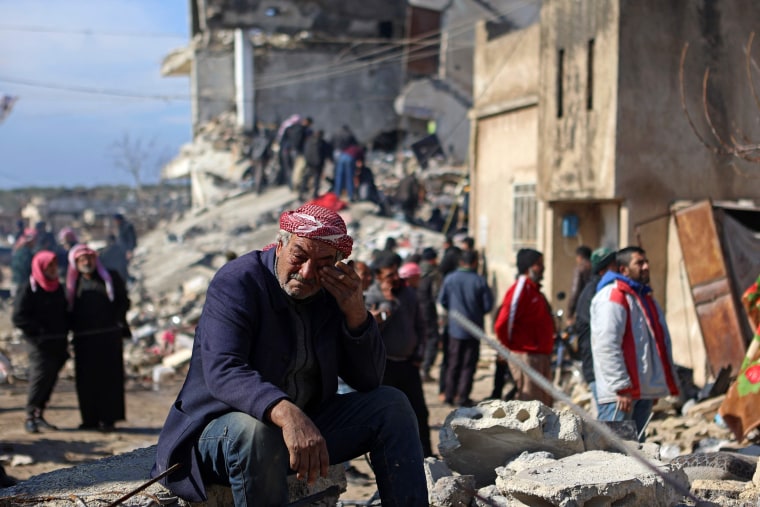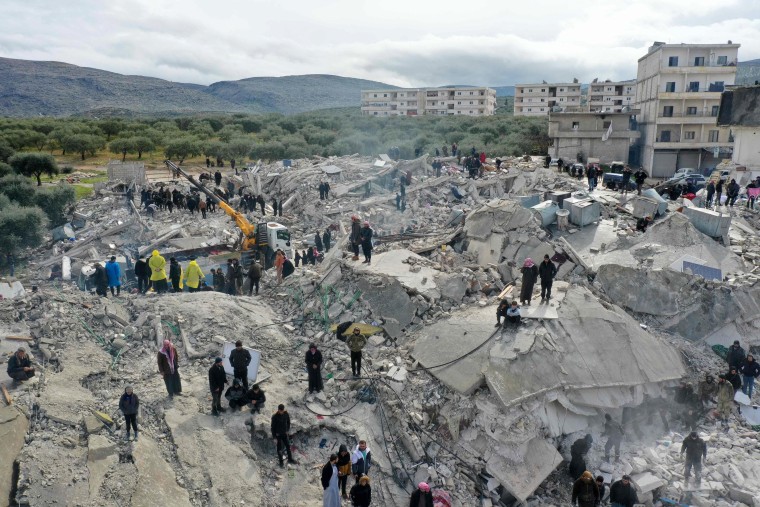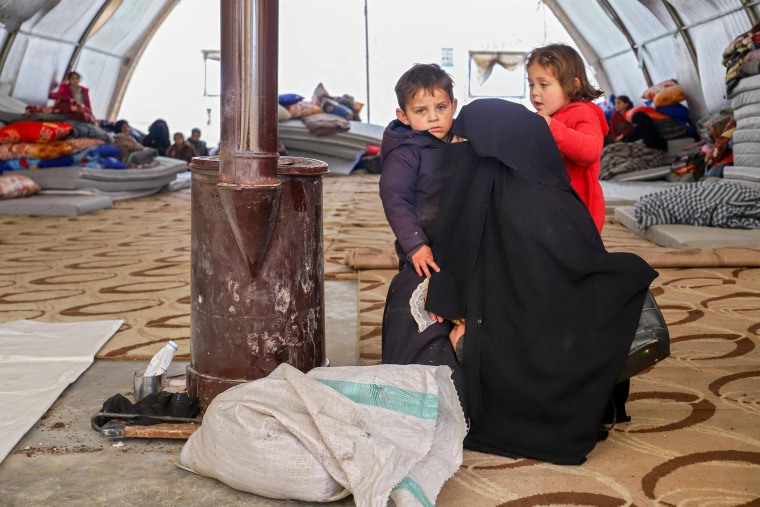The desperate race to save people trapped under the rubble in northern Syria poses unique challenges that aid groups and local volunteers warn could spell deadly delays in help reaching the war-ravaged and earthquake-stricken pocket of the country.
Abdulkafi Alhamdo, a resident of Darat Izza in the northwest, described hearing voices under collapsed buildings as rescuers toiled in freezing conditions with little to no heavy machinery.
“We were hearing screams and messages,” Alhamdo said in an interview with NBC News Now. “We couldn’t do anything,” he added, describing how he and other volunteers removed rubble with their bare hands.
“I couldn’t sleep at night, because they were still in my ears,” he said.

Earthquake damage has temporarily closed the Bab-al-Hawa crossing, a humanitarian aid corridor that is the only official way into the rebel-held area from outside Syria, said Sanjani Quazi, the deputy head of the United Nations Office for the Coordination of Humanitarian Affairs’ regional office for the Syrian crisis.
Delivery of U.N. assistance across the Turkish border into Syria “has been temporarily suspended,” she said.
Bab-al-Hawa is a lifeline for the opposition-controlled sliver of northeastern Syria, a region that is home to many anti-government fighters and their families who fled their hometowns during the war.
Isolated and bombed by forces loyal to President Bashar al-Assad and Syria’s most important international ally, Russia, 90% of the 4.4 million people living in the in the area rely on humanitarian aid, according to the World Food Program.
Weeks before Monday’s earthquake, the U.N. Security Council said in a statement that humanitarian needs in Syria had reached the “highest levels” since the civil war started in 2011, amid an ongoing cholera outbreak and a mercilessly freezing winter.
Charles Lister, the director of the Syria and Counterterrorism and Extremism programs at the Middle East Institute, told NBC News “not a single ounce of international aid has reached northwestern Syria" since the earthquake, due to "extensive damage on the main approach road" in Turkey heading to the Bab-al-Hawa crossing, and a lack of staff.
According to the White Helmets volunteer first responders, by Wednesday morning 1,400 people had died in Syria’s rebel-held territories and more than 2,700 had been injured. The quakes completely destroyed more than 360 buildings and severely damaged over 1,000, the organization added. The numbers are expected to keep rising.
More than 2,000 volunteers were working in sub-zero temperatures through the night in northwest Syria, said Ismail Alabdullah, who has volunteered with the White Helmets since 2013.
The 36-year-old described being woken when the earthquake struck on Monday, frantically grabbing his one-month old daughter from her bed, and running outside of his house with the rest of his family and into the street.
“After just a few minutes, I heard screaming from the neighbors that a building had collapsed on them,” Alabdullah said. “We lost seventeen people in just my neighborhood.”
Even as the prospect of finding survivors diminished with each passing hour, Alabdullah said volunteers saved three siblings trapped under the rubble in Atareb, some 10 miles from the Turkish border.
It has become normal for volunteers to extricate people from crumbled buildings in the area that were bombed by the Assad regime and its Russian backers. Now, with the destructive force of an earthquake piled on top, rescue efforts were “totally different,” Alabdullah said.
Shortages of diesel, generators, heavy-lifting equipment, shelters, and medical facilities have put titanic pressures on rescuers, Alabdullah added.
“So far, no one has said that we will send equipment to northwest Syria,” Alabdullah said of the Syrian government, and international aid. “It will take time, and we will lose lives.”

The earthquake damage is a blow the region’s health care system, with an already crumbling and straining infrastructure, can hardly afford.
“Even before the earthquake, there was a devastating situation in northwest Syria because of a veneer of war,” Dr. Mazen Kewara, the regional director of the Syrian American Medical Society Foundation, said in an interview with NBC News Now.
Among the 38 health facilities the U.S.-based medical charity supports in northwest Syria are four hospitals that were damaged, Kewara said.
“We were forced to evacuate two of them, and we are continuing our work to rescue people,” he added.
Images shared on the foundation’s Twitter account show overturned floor tiles and cracked walls at a maternal and children’s hospital in the city of Al-Dana. Baby incubators lie empty nearby.

“Getting commodities in and around Syria was already very difficult,” Bob Kitchen, the International Rescue Committee’s vice president for emergencies, told NBC News Now. “It’s going to be even more complex with border closures, damaged roads, but we know earthquakes don’t respect international borders, so we need to push forward ourselves.”
There are serious worries that the Assad regime will hinder the distribution of aid to rebel-held areas.
“The Syrian regime has emphasized that they aren’t open to facilitating aid to the northwest through any expansion cross-border but would prefer this is done cross-line from Damascus,” said Emma Beals, a nonresident fellow at the Middle East Institute. “This is logistically unworkable.”
Kitchen said: “Sending search and rescue teams is critically important. The hours and minutes now are really, really the most important thing. We need to focus on finding people under the rubble.
“But then very quickly our focus needs to change on the people left behind alive but injured and are now without homes without income,” he added.